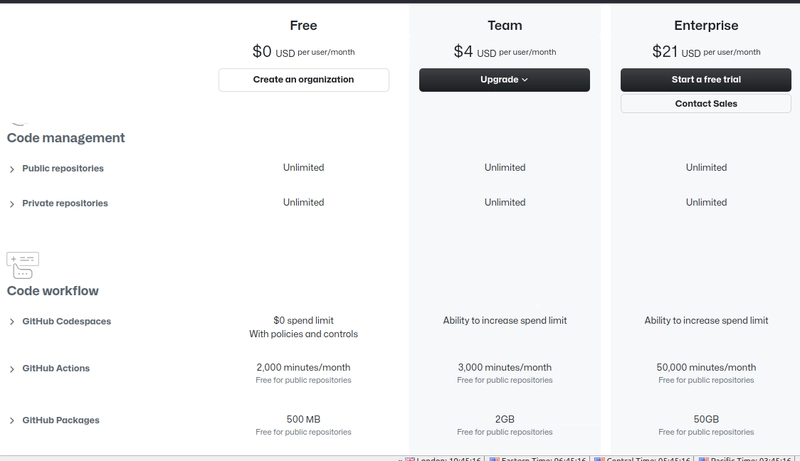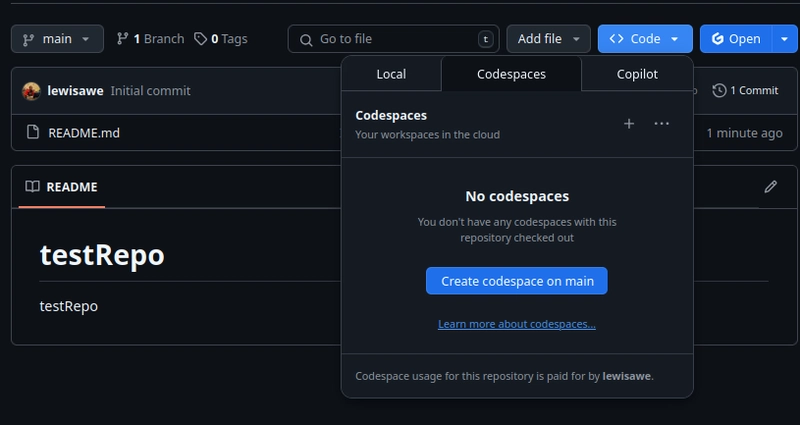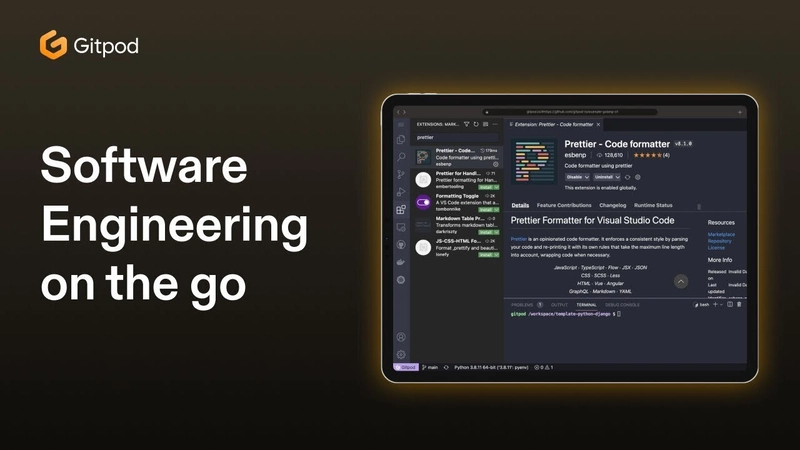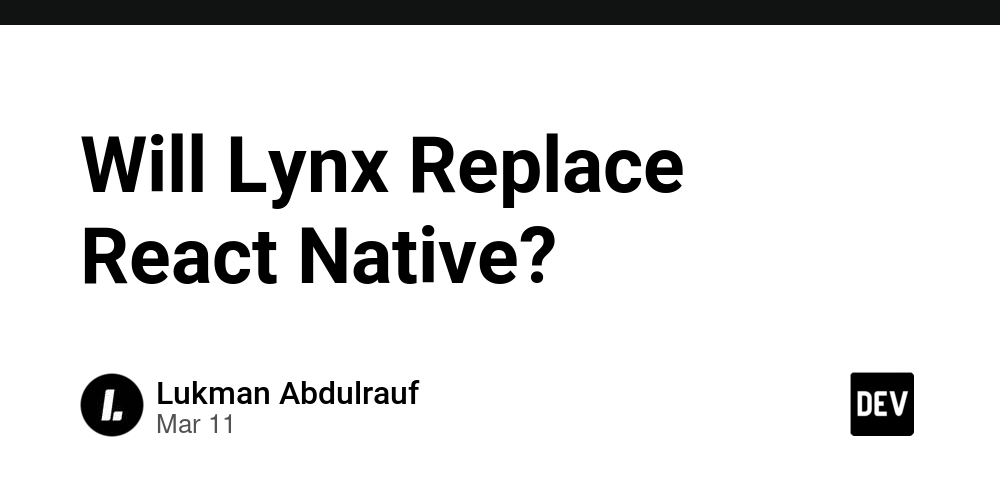AWS Cloud9 Discontinued, Here are My Top Alternatives
Cloud9, the AWS cloud based coding environment, was officially discontinued on July, 2024. While existing users can still access it, AWS no longer offers updates or support. Many developers are now looking for good alternatives. Luckily, two great options I have used are a great replacement, Gitpod and GitHub Codespaces. Both let you code in the cloud with great features for teamwork and efficiency. Today we’ll compare them to help you pick the best one for your needs. GitHub Codespaces GitHub Codespaces provides a seamless cloud development experience directly within GitHub, delivering a full VS Code environment in your browser or desktop. It’s ideal for both individuals and teams already using GitHub who want a Microsoft backed, secure IDE without local setup. Key Features & Benefits: Tight GitHub Integration Full VS Code Experience Adjustable Performance Pre-built Environments . Built-in Security Pricing: Free Tier: Generous option especially for public repos with upto 500mb of storage Paid Plans: Starts at $0.18/hour for additional usage. Enterprise Plans: Available for larger teams needing advanced controls. Setup Prerequisites A GitHub account (personal or organization). Access to a repository (or create a new one). Configuration Steps Quick Start - No Customization Open a Codespace: Navigate to your GitHub repo. Click the "Code" button, then select "Codespaces" > "Create codespace on main". GitHub will launch a default VS Code environment in your browser. Option B: Customize with a devcontainer.json File For advanced setups (custom dependencies, extensions, or environment variables): Add a .devcontainer folder to your repo. Create a devcontainer.json file (or let GitHub generate one): { "image": "mcr.microsoft.com/devcontainers/universal:latest", // Base Docker image "features": { "ghcr.io/devcontainers/features/node:1": { "version": "18" } // Example: Node.js }, "customizations": { "vscode": { "extensions": ["dbaeumer.vscode-eslint", "esbenp.prettier-vscode"] // Recommended extensions } }, "forwardPorts": [3000] // Auto-forwarded ports } Commit & push the changes. Launch Codespace, it will now use your custom configuration. Advanced Settings Machine Type: Adjust CPU/RAM in devcontainer.json via "hostRequirements". Prebuilds: Enable in repo Settings > Codespaces to speed up future launches. Verdict: A polished, secure choice for GitHub centric teams who want minimal setup and maximum integration. Gitpod Gitpod takes a different approach, focusing on speed and ephemeral workspaces. As an open-source alternative, it spins up pre-configured environments in seconds, supporting multiple Git platforms beyond just GitHub. Key Features & Benefits: Instant, Clean Workspaces – Avoid dependency conflicts with fresh environments per task. Multi-IDE Support – Use in-browser or via VS Code and JetBrains desktop IDEs. Cross-Platform Git Support – Works with GitHub, GitLab, and Bitbucket. Self-Hosting Option – Deploy on your own infrastructure for full control. Snapshot Sharing – Save and share workspace states for team collaboration. Pricing: Free Tier: In the new pricing model, you can self host/cloud hosting with no team collaboration and limited environments Paid Plans: From $9/user/month . Self Hosted: For organizations needing customization and privacy. Gitpod Setup Prerequisites A GitHub, GitLab, or Bitbucket account. A repository (or create a new one). Configuration Steps Quick Start Open in Gitpod: Prepend https://gitpod.io/# before your repo URL (e.g., https://gitpod.io/#https://github.com/your/repo). Or install the Gitpod browser extension for one-click launches. Option B: Customize with .gitpod.yml For automated dependency installation, tasks, and IDE settings: Create a .gitpod.yml file in your repo root: image: gitpod/workspace-full:latest # Base Docker image # Install dependencies on startup tasks: - init: npm install # Example: Node.js project - command: npm run dev # Recommended VS Code extensions vscode: extensions: - dbaeumer.vscode-eslint - esbenp.prettier-vscode # Open ports (e.g., for a web app) ports: - port: 3000 onOpen: open-preview Commit & push the file. Launch Gitpod, it will now follow your setup instructions. Advanced Settings Self Hosting: Deploy Gitpod on your own infra using Gitpod’s self hosted solution. Snapshots: Save workspace state via Gitpod Dashboard > Snapshots. Which One Should You Pick? Feature Gitpod GitHub Codespaces Git Support GitHub, GitLab, Bitbucket GitHub only IDE Experience VS Code, JetBrains, Jupyter Full VS Code (browser/desktop) Startup Speed Very fast (pre-built) Fast (pre-builds available) Self-Hosting ✅ Yes ❌ No Team Collaboration Share wo
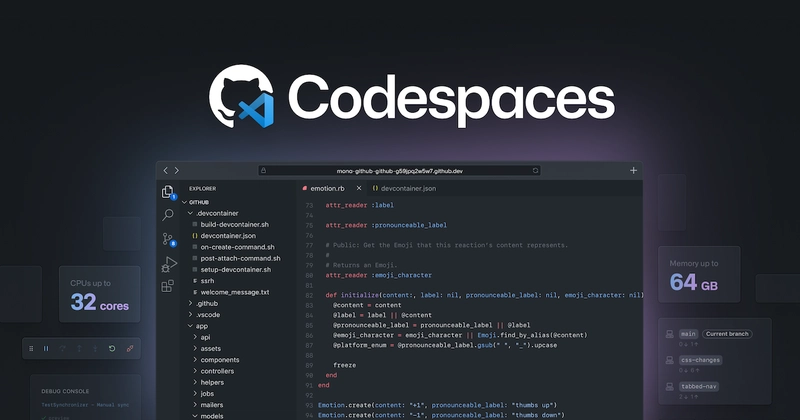
Cloud9, the AWS cloud based coding environment, was officially discontinued on July, 2024. While existing users can still access it, AWS no longer offers updates or support. Many developers are now looking for good alternatives.
Luckily, two great options I have used are a great replacement, Gitpod and GitHub Codespaces. Both let you code in the cloud with great features for teamwork and efficiency.
Today we’ll compare them to help you pick the best one for your needs.
GitHub Codespaces
GitHub Codespaces provides a seamless cloud development experience directly within GitHub, delivering a full VS Code environment in your browser or desktop. It’s ideal for both individuals and teams already using GitHub who want a Microsoft backed, secure IDE without local setup.
Key Features & Benefits:
Tight GitHub Integration
Full VS Code Experience
Adjustable Performance
Pre-built Environments .
Built-in Security
Pricing:
Free Tier: Generous option especially for public repos with upto 500mb of storage
Paid Plans: Starts at $0.18/hour for additional usage.
Enterprise Plans: Available for larger teams needing advanced controls.
Setup
Prerequisites
A GitHub account (personal or organization).
Access to a repository (or create a new one).
Configuration Steps
Quick Start - No Customization
- Open a Codespace:
- Navigate to your GitHub repo.
- Click the "Code" button, then select "Codespaces" > "Create codespace on main". GitHub will launch a default VS Code environment in your browser.
Option B: Customize with a devcontainer.json File
For advanced setups (custom dependencies, extensions, or environment variables):
Add a
.devcontainerfolder to your repo.-
Create a
devcontainer.jsonfile (or let GitHub generate one):
{ "image": "mcr.microsoft.com/devcontainers/universal:latest", // Base Docker image "features": { "ghcr.io/devcontainers/features/node:1": { "version": "18" } // Example: Node.js }, "customizations": { "vscode": { "extensions": ["dbaeumer.vscode-eslint", "esbenp.prettier-vscode"] // Recommended extensions } }, "forwardPorts": [3000] // Auto-forwarded ports } Commit & push the changes.
Launch Codespace, it will now use your custom configuration.
Advanced Settings
Machine Type: Adjust CPU/RAM in
devcontainer.jsonvia"hostRequirements".Prebuilds: Enable in repo Settings > Codespaces to speed up future launches.
Verdict: A polished, secure choice for GitHub centric teams who want minimal setup and maximum integration.




































































